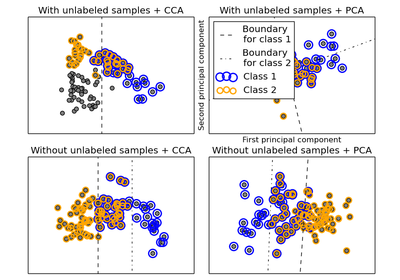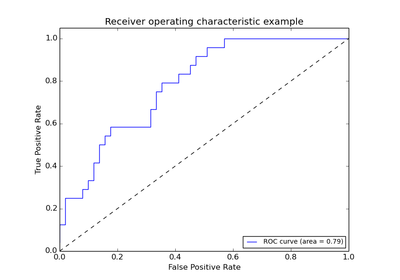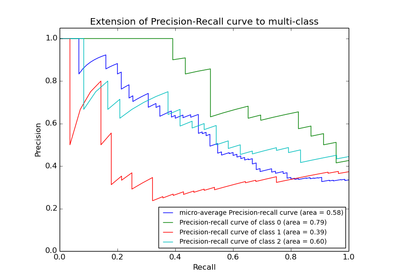sklearn.multiclass.OneVsRestClassifier¶
- class sklearn.multiclass.OneVsRestClassifier(estimator, n_jobs=1)¶
One-vs-the-rest (OvR) multiclass/multilabel strategy
Also known as one-vs-all, this strategy consists in fitting one classifier per class. For each classifier, the class is fitted against all the other classes. In addition to its computational efficiency (only n_classes classifiers are needed), one advantage of this approach is its interpretability. Since each class is represented by one and one classifier only, it is possible to gain knowledge about the class by inspecting its corresponding classifier. This is the most commonly used strategy for multiclass classification and is a fair default choice.
This strategy can also be used for multilabel learning, where a classifier is used to predict multiple labels for instance, by fitting on a 2-d matrix in which cell [i, j] is 1 if sample i has label j and 0 otherwise.
In the multilabel learning literature, OvR is also known as the binary relevance method.
Parameters: estimator : estimator object
An estimator object implementing fit and one of decision_function or predict_proba.
n_jobs : int, optional, default: 1
The number of jobs to use for the computation. If -1 all CPUs are used. If 1 is given, no parallel computing code is used at all, which is useful for debugging. For n_jobs below -1, (n_cpus + 1 + n_jobs) are used. Thus for n_jobs = -2, all CPUs but one are used.
Attributes: `estimators_` : list of n_classes estimators
Estimators used for predictions.
`classes_` : array, shape = [n_classes]
Class labels.
`label_binarizer_` : LabelBinarizer object
Object used to transform multiclass labels to binary labels and vice-versa.
`multilabel_` : boolean
Whether a OneVsRestClassifier is a multilabel classifier.
Methods
decision_function(X) Returns the distance of each sample from the decision boundary for each class. fit(X, y) Fit underlying estimators. get_params([deep]) Get parameters for this estimator. predict(X) Predict multi-class targets using underlying estimators. predict_proba(X) Probability estimates. score(X, y) set_params(**params) Set the parameters of this estimator. - __init__(estimator, n_jobs=1)¶
- decision_function(X)¶
Returns the distance of each sample from the decision boundary for each class. This can only be used with estimators which implement the decision_function method.
Parameters: X : array-like, shape = [n_samples, n_features] Returns: T : array-like, shape = [n_samples, n_classes]
- fit(X, y)¶
Fit underlying estimators.
Parameters: X : {array-like, sparse matrix}, shape = [n_samples, n_features]
Data.
y : array-like, shape = [n_samples] or [n_samples, n_classes]
Multi-class targets. An indicator matrix turns on multilabel classification.
Returns: self :
- get_params(deep=True)¶
Get parameters for this estimator.
Parameters: deep: boolean, optional :
If True, will return the parameters for this estimator and contained subobjects that are estimators.
Returns: params : mapping of string to any
Parameter names mapped to their values.
- multilabel_¶
Whether this is a multilabel classifier
- predict(X)¶
Predict multi-class targets using underlying estimators.
Parameters: X : {array-like, sparse matrix}, shape = [n_samples, n_features]
Data.
Returns: y : array-like, shape = [n_samples]
Predicted multi-class targets.
- predict_proba(X)¶
Probability estimates.
The returned estimates for all classes are ordered by label of classes.
Note that in the multilabel case, each sample can have any number of labels. This returns the marginal probability that the given sample has the label in question. For example, it is entirely consistent that two labels both have a 90% probability of applying to a given sample.
In the single label multiclass case, the rows of the returned matrix sum to 1.
Parameters: X : array-like, shape = [n_samples, n_features]
Returns: T : array-like, shape = [n_samples, n_classes]
Returns the probability of the sample for each class in the model, where classes are ordered as they are in self.classes_.
- set_params(**params)¶
Set the parameters of this estimator.
The method works on simple estimators as well as on nested objects (such as pipelines). The former have parameters of the form <component>__<parameter> so that it’s possible to update each component of a nested object.
Returns: self :




